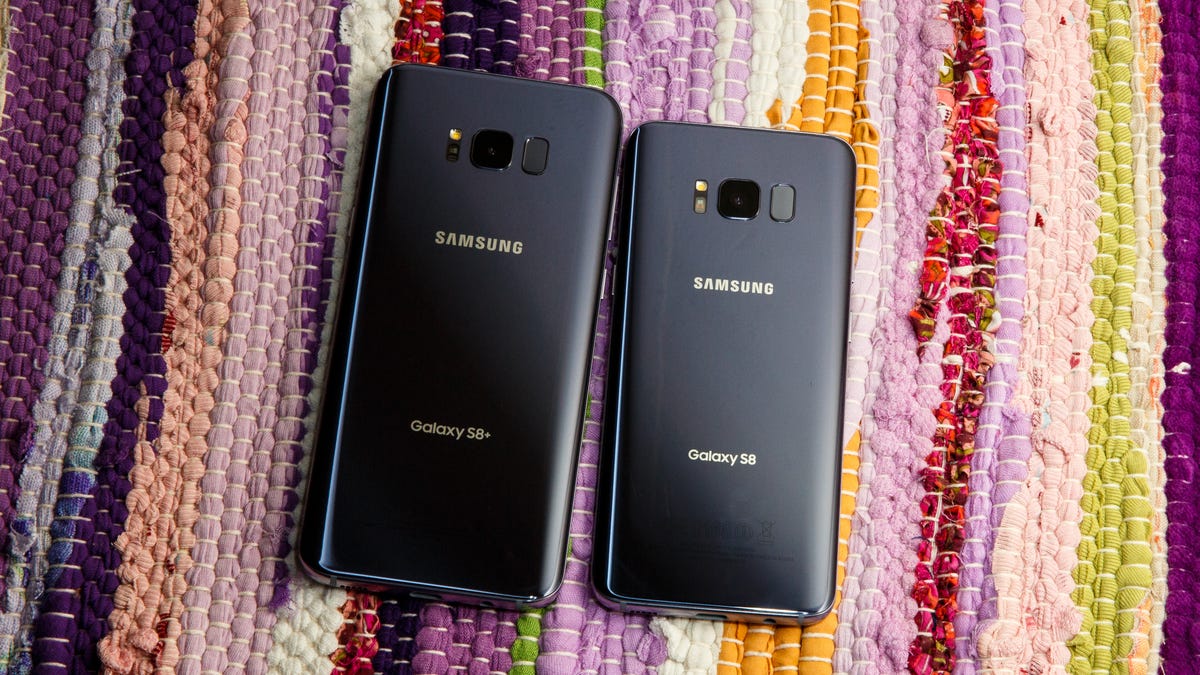Samsung Galaxy S8: Should you upgrade?
Samsung's newest superphone looks impressive, but it may not be an automatic upgrade. Here's what you need to know.

The Samsung Galaxy S8 and larger Galaxy S8 Plus are two of the most anticipated phones of the year, and now they're official it's easy to see why. Between the stunning design and high-end specs, Samsung's newest phones have many people ready to throw down some serious cash, but should you take the plunge?
Here are two reasons why you should, four reasons why you may want to hold off -- and one great big question mark.
Reasons to take the plunge
The stunning design
Samsung has outdone itself. The Galaxy S8 and Galaxy S8 Plus are genuinely spectacular. Both phones have large displays that curve on each side and the bezel around the screen is almost nonexistent. But despite all this screen real estate, the phones aren't massive.
From left to right: Galaxy S7, Galaxy S8, Galaxy S8 Plus, iPhone 7 Plus.
Samsung managed to squeeze a 5.8-inch 2,960x1,440-pixel display on the Galaxy S8 into a body that is only a wee bit larger than last year's Galaxy S7. Meanwhile, the larger Galaxy S8 Plus has a massive 6.2-inch display, but in a body that is only slightly larger than an iPhone 7 Plus , which has a 5.5-inch screen.
The latest and greatest specs
Samsung Galaxy S8 launch
To complement the beautiful design, the Galaxy S8 and Galaxy S8 Plus pack cutting-edge hardware. Both phones will be the first you can buy with an octa-core Snapdragon 835 processor (or Exynos 8895 depending on region), which includes support for superfast gigabit LTE.
This high-end chip is paired with 4GB of RAM, 64GB of internal storage (with support for more through the microSD slot) and a 12-megapixel rear camera. Other features include wireless charging, IP68 water resistance, Android Nougat 7.1, and, yes, a headphone jack.
The big question mark: Bixby
Hardware is only half the story. Samsung has also refined its software. Along with a lighter version of its TouchWiz interface, the Galaxy S8 and Galaxy S8 Plus are the first phones to launch with Bixby, Samsung's new smart digital assistant that is designed to compete with Apple 's Siri, Amazon's Alexa and (sort of) Google Assistant.
Bixby promises to do more than other digital assistants. Samsung has said that anything you can do with touch can also be done through Bixby, but we'll have to actually use it for awhile to verify how true that is. The assistant uses machine learning to help improve your experience with the device. It can remind you of upcoming appointments, recommend activities and more. For example, if you always call your significant other at noon, Bixby will notice the trend and remind you on days you forget to call. There's even an image recognition element, so you can use the camera to translate and scan things.
The problem? In our initial (admittedly very short) hands-on time with Bixby, it wasn't terribly smooth. We'll reserve judgment until we fully review the phone, but this service is very much in beta until further notice.
Reasons to hold off
They're undoubtedly expensive
The stunning design of the Galaxy S8 and Galaxy S8 Plus will come at a hefty cost. The S8 will cost $750, £689 or AU$1199, while the larger model is priced at $850, £779 or AU$1349. Monthly installment plans, which will vary by carrier, will make that pill easier to swallow, but be prepared to pay.
You might break it
Or at least buy a case. The all-glass body and large screen doesn't look like it will be able to handle many drops. We shattered our Galaxy S7 and if you're clumsy, you may want to hold off on the Galaxy S8.
You already have Google Assistant
Bixby sounds cool, but is it worth shelling out a ton of money? Probably not, especially since the fully capable Google Assistant is slated to come to all Android phones running Marshmallow and Nougat. (Yes, Google Assistant and Bixby will exist side by side on the Galaxy S8.)
Your current phone is still great
That brings us to our last point. Your current phone is probably still great. If you bought a Galaxy S7 (or one of the other great flagship phones we saw last year), there's no imperative to upgrade. Your phone already has a high quality display, a great camera and high-end specs.
But if your phone is an older model (two-plus years) or a budget phone that has been hampered by software updates, the Galaxy S8 and Galaxy S8 Plus could be right for you.
To learn more about the phones, check out CNET's first impression on the Galaxy S8 here and the Galaxy S8 Plus here.

